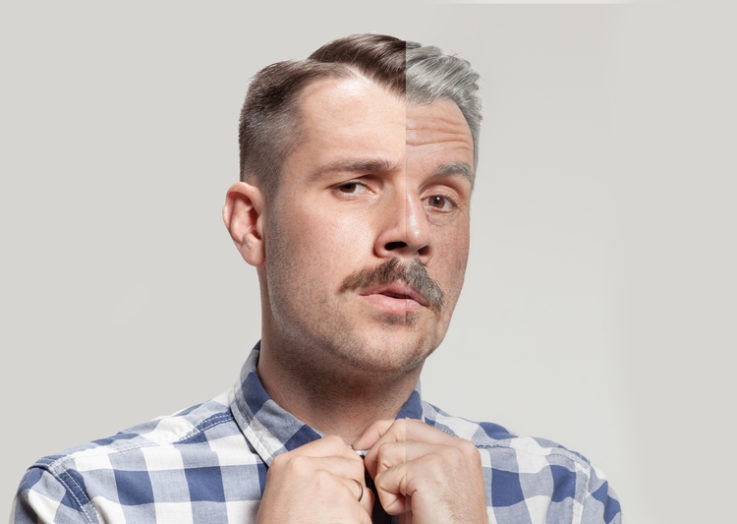Every year, when your birthday rolls around, you add one year to your “chronological age,” which refers to how many years you’ve been alive. It doesn’t matter if you’ve lived well and, for the most part, made good, healthy decisions, or if you’ve instead adopted a mostly sedentary lifestyle, subscribed to a more typical western-style junk-food diet, and indulged in some questionable habits. Your age is your age.
Yet your chronological age is only a very small part of the story. As you’ve probably noticed, not everyone ages at the same rate. Some get older faster; others age more gracefully and gradually. You can probably think of someone right now who looks younger than her actual age; on the other hand, I’m sure you know a person or two who looks strikingly older than his chronological age. And that brings us to “biological age.”
When you were born determines your chronological age, but how do you figure out your biological age, or how old you seem to be? What factors influence your biological age? Is there anything you can do to reduce your biological age or, figuratively speaking, turn back time?
Biological Age: How Old Are You Really?
Your biological age, sometimes called your “actual age” or “real age,” takes into consideration much more than just a date on the calendar, such as:
- Genetics (How long-lived were your parents or grandparents?)
- Geography (Different parts of the world are associated with longer or shorter life expectancy.)
- Gender/sex (Are you male or female?)
- Education (Those with a higher education tend to live longer.)
- Dietary patterns (Is your diet mostly healthy, nutrient-dense whole foods , or is it made up mostly of refined convenience foods?)
- Alcohol consumption (Do you drink alcohol? If so, how much and how often?)
- Exercise patterns (How often do you exercise?)
- Muscular strength (How many pushups can you do? Are you stronger or weaker than other folks your age?)
- Flexibility (How flexible are you?)
- Sleep habits (Do you regularly get 7 to 9 hours of sleep per night or way less?)
- Stress and stress management (How often do you experience stress? And how do you cope with it?)
- Mood (Are you happy?)
- Civil/marital status (Are you in a good relationship/partnership?)
- Social support (Do you have a good circle of friends you can lean on?)
- Health metrics (What is your body mass index, your resting heart rate, blood pressure, and cholesterol levels?)
- Health hygiene (How often do you see your doctor and dentist?)
While some of this is more difficult to control, such as your genetics, family history, and where you were born, up to 80% of your health and vitality rests in your own hands and, more specifically, in the choices you make every day.
There are some fun online calculators that claim to provide an estimate of your biological age, but please note, this is not an exact science, and results can vary tremendously from one calculator to the next. (For example, my biological age was estimated to be between 26 and 50 years old, and how long I was predicted to live ranged between 91 and 102 depending on which calculator I used and what questions were asked.) There is no universal consensus on biological age, so if you do decide to try one of these quizzes, remember to take the results with a grain of salt.
Warning Signs You Are Aging Faster
Have you ever stood in line at a grocery store and noticed the “old person” in front of you and then realized he or she is actually someone you went to high school or college with? Do you look that old? Are you aging better (or worse) than your old school mates?
Here are some signs to watch for that indicate you may be aging faster:
- You’re losing hair (and not just what’s on your head).
- You started to go gray before you expected.
- You struggle to lift that 30-pound bag of dog food into your cart or get the groceries into the house.
- You struggle to open jars.
- You find yourself falling behind when walking with friends because you just can’t keep up.
- It’s challenging to walk up stairs.
- It takes longer than it used to to heal from strains, bruises, and injuries.
- Your skin is starting to sag and wrinkle.
- Your skin is often dry and flaky.
- Your skin, especially your face, is starting to show brown age spots.
- If you’re a woman, your menstrual cycle is irregular.
- You no longer enjoy social activities with friends, and you make excuses to stay home.
- You suffer from brain fog or “senior moments.”
- You regularly struggle with how to cope with stress.
- You’ve gained weight, especially around the waist.
- You wake up frequently throughout the night and have trouble getting restful sleep.
- People assume you’re older than you are.
30 Ways to Slow Down Your Biological Clock
Research shows that happiness peaks around the age of 23, and after that, I don’t know too many people who really want to advance their age (although happiness again peaks around the age of 69). In fact, many of us would love to slow, stop, or even reverse our age. Is it possible? Most experts suggest the answer is absolutely yes. By changing how you live, you can turn back your body clock by 10 or even more years!
How? Here are some of the suggestions:
- Manage stress levels.
- Avoid multitasking.
- Eat a healthy, nutrient-rich diet that focuses primarily on whole, minimally processed foods including a diverse array of colorful vegetables (5+ per day) and fruits (2+ per day), nuts, seeds, legumes and animal products from traditionally-raised animals.
- Exercise at least 30 minutes a day or at least 2 ½ hours per week.
- Increase your strength and flexibility.
- Ensure you are getting enough quality sleep (7 to 9 hours per night).
- Control your blood pressure.
- Maintain healthy triglyceride and cholesterol levels.
- Spend less time sitting.
- Prioritize healthy relationships.
- Become more social.
- Stay positive and optimistic.
- Walk regularly.
- Sit up straight (don’t slouch).
- Limit or avoid sugary drinks and snacks.
- Limit or, better yet, avoid processed, junk, and fast foods.
- Limit TV watching (and other passive, sedentary behaviors).
- Schedule regular doctor and dentist appointments.
- Drink alcohol in moderation (if at all).
- If you smoke, quit. If you don’t smoke, don’t start.
- Stop worrying or regularly running through worst-case scenarios.
- Watch your weight/avoid weight gain.
- Provide nutrients your body needs to heal, including quality proteins.
- Supplement with collagen peptides to support healthy skin, hair, nails, and more.
- Supplement with a quality multivitamin.
- Support your body with additional anti-aging nutrients like curcumin, glutathione, and CoQ10, to help combat cellular aging and support cellular energy production.
- Protect your skin with sunscreen.
- Use a quality skin serum that contains vitamins C and E and hyaluronic acid (and doesn’t contain parabens, phthalates, and sulfates) to help fight the visible signs of aging. Don’t forget to use it on your delicate eye, neck, and upper chest skin.
- Sleep on your back or use a silk or satin pillowcase to help avoid crease lines (which appear like wrinkles on your face) that can become permanent.
- If you live in a drier climate, add moisture to the air with a humidifier or bowl of cool water, especially during the winter.
This may seem like a long list of things you should do, but honestly, you’re probably already doing some or even most of them. And instead of being overwhelmed, it’s encouraging to realize there are so many things that you can do to reduce your biological age. Now, just pick some low-hanging fruit from the list above and start the process of shaving off 1, 5, or even 10 years from your body age. So, when your old school mates see you in line at the store, they’ll wonder how you’ve managed to defy the aging process.









